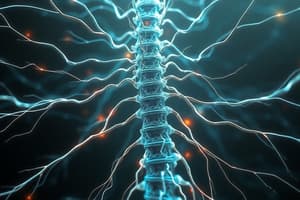Podcast
Questions and Answers
What is the general function of the spinal cord?
What is the general function of the spinal cord?
- Storing long-term memories
- Producing hormones for the body's homeostasis
- Acting as a conduit for sensory and motor signals between the brain and the rest of the body (correct)
- Generating conscious thoughts and decisions
What role does the spinal cord play in reflex responses?
What role does the spinal cord play in reflex responses?
- Controlling the body's temperature regulation
- Filtering sensory information before reaching the brain
- Initiating conscious responses to sensory stimuli
- Generating and coordinating reflex responses (correct)
What happens when a sensory receptor in the body detects a stimulus?
What happens when a sensory receptor in the body detects a stimulus?
- The sensory signal triggers a conscious decision-making process
- The sensory signal is ignored by the nervous system
- The sensory signal is immediately processed in the brain
- The sensory signal is rapidly transmitted to the spinal cord (correct)
What type of signals does the spinal cord relay between the brain and the rest of the body?
What type of signals does the spinal cord relay between the brain and the rest of the body?
What characterizes reflexes in the context of the spinal cord?
What characterizes reflexes in the context of the spinal cord?
Flashcards are hidden until you start studying
Study Notes
General Function of the Spinal Cord
- Serves as the main pathway for transmitting information between the brain and the body.
- Coordinates motor control and sensory information processing.
- Supports basic bodily functions such as breathing and heart rate regulation.
Role in Reflex Responses
- Enables rapid responses to stimuli through reflex arcs, bypassing the brain for quicker reactions.
- Involves a sensory neuron that detects a stimulus and communicates with interneurons within the spinal cord.
- Outputs signals from motor neurons leading to immediate muscle contraction or action.
Sensory Receptor Detection
- Sensory receptors, upon detecting a stimulus, generate electrical signals known as action potentials.
- These signals are transmitted via sensory neurons to the spinal cord for processing.
- The spinal cord interprets these signals and can elicit a reflexive action without needing to consult the brain.
Signal Relay between Brain and Body
- Relays sensory signals to the brain for interpretation and processing.
- Transmits motor signals from the brain to skeletal muscles and organs for movement and regulation.
- Functions as a crucial conduit for communication, ensuring the brain and body can interact effectively.
Characteristics of Reflexes
- Occur automatically and instinctively in response to a specific stimulus.
- Do not require conscious thought, allowing for immediate reactions to potentially harmful situations.
- Typically involve a simple neural pathway known as a reflex arc, which includes sensory neurons, interneurons, and motor neurons.
Studying That Suits You
Use AI to generate personalized quizzes and flashcards to suit your learning preferences.




